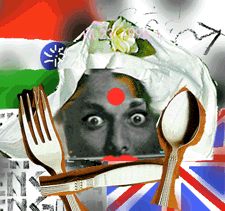Miscellanea/Kamala Das
Politicians blotch up the landscape. Nobody knows how to clear the mess
 Beginning a new column is like entering into a marriage arranged
by others. One worries about a possible incompatibility with the
conceptual audience.
Beginning a new column is like entering into a marriage arranged
by others. One worries about a possible incompatibility with the
conceptual audience.
Am I likable? Do the topics I fancy writing about interest others?
Such questions provide unease and delay the decisions.
This is to be a column directed at the largest audience imaginable.
What is common in me and in all of them?
Not poetry. Not art. Not even the political manifesto of a non-political
person living in the small town of Cochin. An editor of a Bombay
papers weekend issue advised me not to write on Cochin in my column.
Bombayites only like to read of their own city or of the metros
of the West. The readers were anglicised and impatient with desk
talk. The upper middle classes are more westernised today than
their ancestors were, while the British ruled Indian. Dress might
be ethnic but the dialect was most certainly a hybrid with touches
of Goanese.
"Yawl are good people Mrs Das although yawl are Hindus,"
said Maria, who once had been my youngest child's tutor. Later
she comforted me more by saying "yawl are Madrasis, but nobody can
make out from your behaviour. Yes Mrs Das yawl are cultured
people."
I do not dread the arrival of guests from other countries.
They can adjust to the patterns of our routine. But I dread the
westernised Indian who looks down upon the eating habits of Indians.
A lady with a painted face came to stay a week with me. She was
my sister's friend's friend and had been given my address. When
she joined us for lunch she cried.
"Mrs Das, where is the serviette? How can I begin eating without
the serviette?"
Some tiny terry towels were brought out in order to let the lady
eat. As a rule I am insufferably informal, and I have this habit
of heaping everything into a thali and seating myself before the
television to eat my supper. Westernised guests upset my cosy schedule.
Formalities and polished talk eat into my precious time. I have
no inclination to give after-dinner speeches either.
After the television programme I go back to my writing desk. The easy going nonfinicky
guests can stay on for a month in my house and enjoy each day.
He or she will get enough food to eat, a bed to sleep on and a
bath with a geyser. There are no swanky serviettes here. No lace doilies
either, the absence of pretty bric a brac or antique furniture
might annoy the aesthete. But I have a clear idea of what I want
in my home to make my life pleasant. I want space and fresh air.
I want blank spaces on the wall that will relax my eyes.
I go to art galleries to inaugurate art exhibitions. I admire
the dexterity displayed by the modern artists. But I shall never
hang a gaudy modern painting in my bedroom or study. Mine are
tired eyes. I hang the reproduction of a Ravi Varma in my bedroom, a
voluptuous woman holding her infant, a rotund gem.
More people speak English in India than in Britain according to
a British Council assessment. The young urbanites hardly ever
speak any regional language. And yet there is a furore against
English in almost every state of this country.
Instead of regarding
English as one of the national languages people would like to
see it exit from the Indian shores. Then the exit door will open
for scientific, medical and engineering education all of which
will vanish with English the best thing that the British gave
to India is English. The Railways came next.
Young Indians ought not to listen to the sentimental rigmarole
dished out by the disillusioned politicians of the country. Even
with a foolish remark they are anxious to make an impact.
In Kerala recently some politicians have been accused of raping
minor girls. There are other unsavoury activities this bitter breed
indulges in. Politicians blotch up the landscape. Nobody knows how to
clear the mess.
Kamala Das, one of India's bestknown poets, will contribute a
weekly column to these pages.
Illustration: Dominic Xavier
|





 Beginning a new column is like entering into a marriage arranged
by others. One worries about a possible incompatibility with the
conceptual audience.
Beginning a new column is like entering into a marriage arranged
by others. One worries about a possible incompatibility with the
conceptual audience.